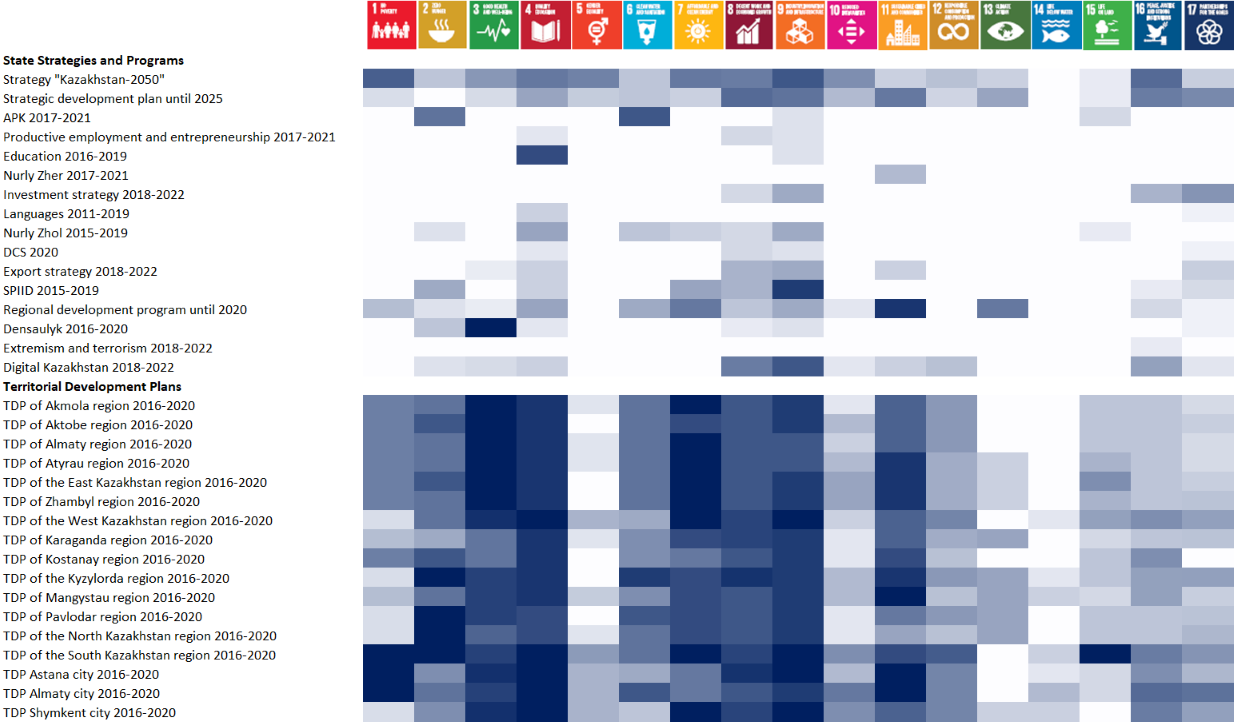Policies for Sustainable Development Goals
Policies for Sustainable Development Goals (SDGs) are a set of guidelines and strategies aimed at achieving the 17 global sustainable development goals set by the United Nations. These policies are designed to address the economic, social, and environmental challenges faced by countries across the world and to promote sustainable development. Policies for SDGs involve various stakeholders, including governments, civil society organizations, private sector, and individuals, and require their collective efforts to achieve the SDGs. The policies provide a framework for the implementation of sustainable development initiatives and offer a roadmap to ensure that no one is left behind. By adopting policies for SDGs, countries can move towards a sustainable and equitable future.
SDGs Mainstreaming in national policy documents
 Kazakhstan
Kazakhstan
Kazakhstan has integrated the SDGs into its “Kazakhstan 2050” strategy, which aims to transform the country into a diversified and innovative economy. The country’s Voluntary National Review (VNR) in 2018 highlighted progress in areas such as health, education, and economic growth, while acknowledging challenges related to gender equality, environmental sustainability, and regional disparities. Kazakhstan has also launched several initiatives to promote the SDGs, such as the “100 Concrete Steps” national plan, which includes specific targets related to the SDGs.
The Rapid Integrated Assessment (RIA) Tool aims to support countries in mainstreaming the Sustainable Development Goals (SDGs) into national and subnational planning. Kazakhstan conducted assesement of State Strategies and Programs and Territorial Development Plans

 Kyrgyzstan
Kyrgyzstan
Kyrgyzstan’s “National Sustainable Development Strategy” (NSDS) for 2018-2040 aims to achieve sustainable and inclusive development through economic diversification, social equity, and environmental protection. The country’s VNR in 2020 highlighted progress in areas such as poverty reduction, education, and healthcare, while identifying challenges related to climate change, water scarcity, and governance. Kyrgyzstan has also developed an SDG Action Plan for 2021-2023, which focuses on improving data collection and monitoring, promoting sustainable agriculture and tourism, and strengthening partnerships with civil society and the private sector.
 Tajikistan
Tajikistan
Tajikistan’s “National Development Strategy” for 2016-2030 integrates the SDGs and focuses on improving human development, promoting economic growth, and protecting the environment. The country’s VNR in 2019 highlighted progress in areas such as access to clean water, maternal and child health, and education, while identifying challenges related to poverty, gender inequality, and energy security. Tajikistan has also developed an SDG Roadmap for 2018-2030, which includes specific targets and indicators for each SDG, and aims to mainstream the SDGs into national policies and programs.
 Turkmenistan
Turkmenistan
Turkmenistan has developed an “SDG Implementation Framework” for 2016-2020, which focuses on improving social and economic development, environmental sustainability, and governance. However, the country has not yet submitted a VNR to the UN. Turkmenistan has also launched several initiatives to promote the SDGs, such as the “National Plan of Action for Climate Change Adaptation and Mitigation” and the “National Program for the Improvement of the Social and Living Conditions of Rural Population.”
 Uzbekistan
Uzbekistan
Uzbekistan’s “Action Strategy” for 2017-2021 integrates the SDGs and focuses on economic liberalization, social modernization, and regional cooperation. The country’s VNR in 2020 highlighted progress in areas such as poverty reduction, education, and healthcare, while acknowledging challenges related to gender equality, environmental sustainability, and governance. Uzbekistan has also launched several initiatives to promote the SDGs, such as the “National Action Plan for the Implementation of the Sustainable Development Goals” and the “Green Growth Strategy.”
MAPS: Mainstreaming, Acceleration and Policy Support
The United Nations (UN) has supported countries in Central Asia through the deployment of cross-thematic, multiagency MAPS (Mainstreaming, Acceleration and Policy Support) missions. These missions aim to support policy-making for the Sustainable Development Goals (SDGs) by identifying gaps, opportunities, and policy solutions in key areas. The MAPS approach includes consultations with government officials, civil society, and other stakeholders to ensure a comprehensive analysis of the country’s development priorities. In Central Asia, MAPS missions have been carried out in Kazakhstan, Kyrgyzstan, Tajikistan, Turkmenistan, and Uzbekistan. They have resulted in the development of action plans that focus on areas such as education, health, economic growth, and environmental sustainability. The UN system’s support through MAPS missions in Central Asia has helped to strengthen national capacities for SDG implementation and monitoring, and contribute to the achievement of the SDGs in the region.
- Kazakhstan: “Mainstreaming, Acceleration and Policy Support for the SDGs in Kazakhstan” (2018)
- Kyrgyzstan: “Kyrgyzstan: Accelerating the SDGs” (2020)
- Tajikistan: “Tajikistan: MAPS Mission Report” (2018)
- Turkmenistan: “Turkmenistan: MAPS Mission Report” (2017)
- Uzbekistan: “Uzbekistan: MAPS Mission Report” (2018)